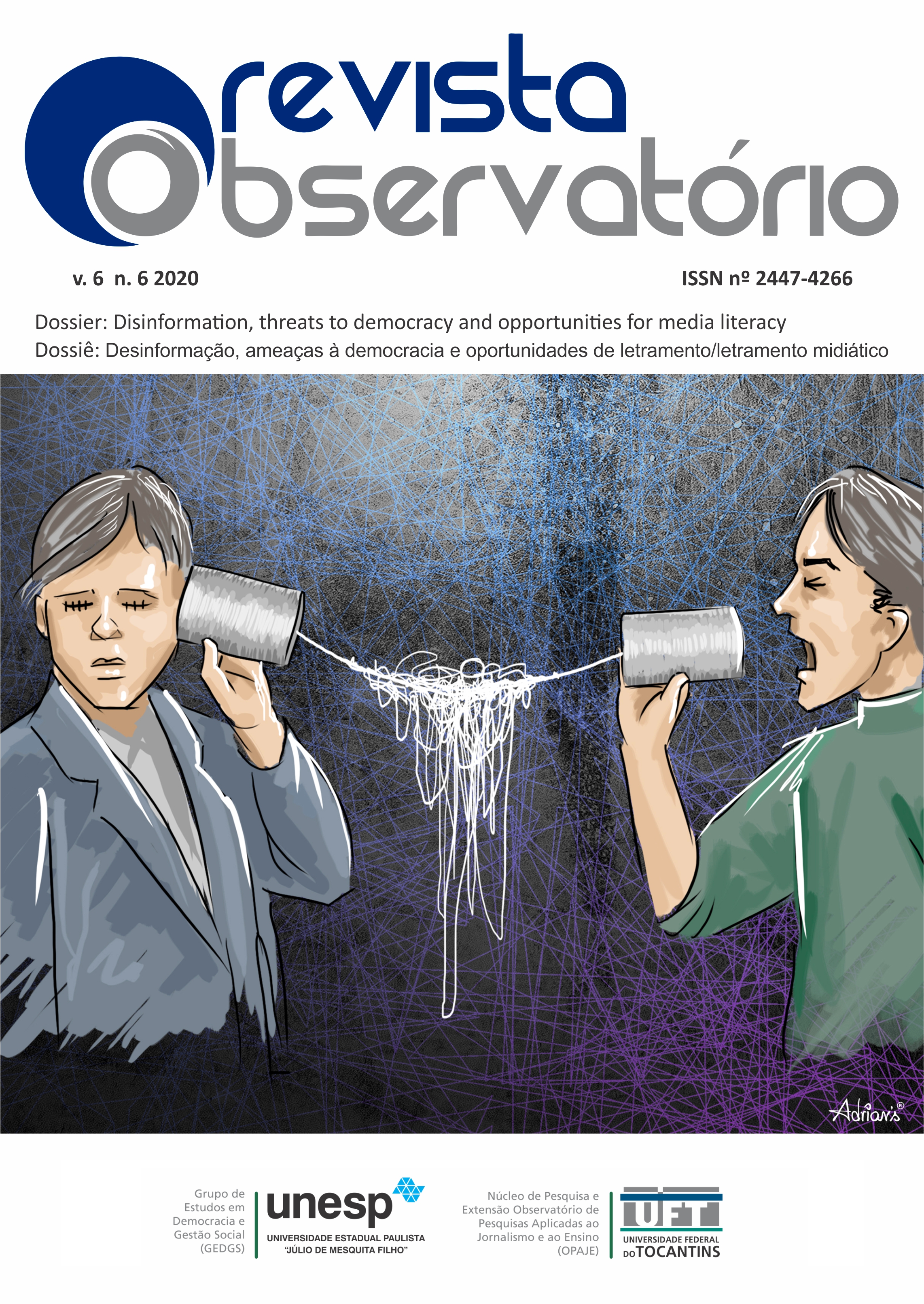MISINFORMATION IN DIGITAL CULTURE: reflections from Cognitive Democracy and Dialogue between Knowledges
DOI:
https://doi.org/10.20873/uft.2447-4266.2020v6n6a10enKeywords:
knowledge, disinformation, media educationAbstract
The changes that represent the accessible technology and the use of social networking media in digital culture pose new questions and challenges as we are, at the same time, producers and consumers of information. Disinformation affects public life and threatens democracy. Based on the ideas of Cognitive Democracy (Morin, 2014) and the Knowledge Dialogue (Leff, 2006), we will discuss the theme in the light of an analytical framework of the research “Values and Arguments in the assimilation and propagation of disinformation: a dialogical approach”. Media education appears as a historic and democratic need to combat fake news. In this sense, the possible solutions should build and strengthen collective learning about communicational and educational processes that promote reading and understanding of codes to interaction in social media.
Downloads
References
Antunes, R. (2018). O privilégio da servidão [The privilege of servitude]. São Paulo, Brazil: Boitempo.
Arendt, H. (1995). Verdade e Política [Truth and politics]. Relógio d'Agua.
Arendt, H. (2012). Origens do totalitarismo [Origins of Totalitarianism]. São Paulo: Companhia das Letras, 2012.
Berry, D.M. (2012). Introduction: Understanding the Digital Humanities. In: Berry D.M. (eds), Understanding Digital Humanities. Palgrave Macmillan, London. https://doi.org/10.1057/9780230371934_1
Bontcheva, K., & Posetti, J. (2020). Combating the disinfodemic: Working for truth in the time of COVID-19. United Nations Educational, Scientific and Cultural Organization (UNESCO). https://en.unesco.org/sites/default/files/disinfodemic_deciphering_covid19_disinformation.pdf
Cunha, P. J (2018). Fake news, big business. In: Bernardo, J. H. R. (Ed), Communication and Human Rights (pp..29-33). Henfil Education and Communication Association. https://intervozes.org.br/arquivos/interman005comdhs18.pdf
Dardot. P. & Laval, C. (2016). A nova razão do mundo: ensaio sobre a sociedade neoliberal [The new reason for the world: an essay on liberal society]. Boitempo.
Fallis, D. (2015). What is disinformation? Exploring Philosophies of Information. Library Trends , 63 (3): 401-426. The Board of Trustees (Edited by Ken Herold), University of Illinois.
Floridi, L (1996). Brave.Net.World: The internet as a disinformation superhighway?. The Electronic Library, 14 (6), 509-514. Retrieved from : http://dx.doi.org/10.2139/ssrn.3128817
Fonseca, A.B. (2020, May 11). A Covid-19 and the disinformation that kills. Le Monde Diplomatique Brasil. https://diplomatique.org.br/a-covid-19-e-a-desinformacao-que-mata/
Freire, P. (1971a). Extensão ou comunicação? [Extension or communication?]. Paz e Terra.
Freire, P. (1971b). Educação como prática de liberdade [Education as a practice of freedom]. Paz e Terra.
Leff, E. (2006). Racionalidade ambiental: a reapropriação social da natureza [Environmental rationality: the social reappropriation of nature]. Rio de Janeiro, Brazil: Civilização Brasileira.
Lima, A. V. (2011). Comunicação e cultura: as ideias de Paulo Freire (2d ed.). Universidade de Brasília: Fundação Perseu Abramo..
Morin, E. (1999). O método 3: o conhecimento do conhecimento [The method 3. the knowledge of knowledge]. Sulina.
Morin, E. (2003). O método 1: a natureza da natureza. [The Method 1: The nature of nature] (2nd ed.). Sulina, 2003.
Morin, E. (2007). O método 6: ética [The method 6: ethics]. Sulina.
Morin, E. (2011). O método 4: as ideias, habitat, vida, costumes, organização [Method 4: Ideas: habitat, life, customs, organization] (5nd ed.). Sulina.
Morin, E. (2012). O método 5: a humanidade da humanidade [The method 5: the humanity of humanity] (5nd ed.). Sulina.
Morin, E. (2014). A cabeça bem feita: repensar a reforma, repensar o pensamento [The well-made head : rethinking the reform, rethinking the thought] . Rio de Janeiro, Brazil: Bertrand Brasil.
Morin, E. (2015). O método 2: a vida da vida [The method 2: The life of life] (5th ed.). Sulina.
Organization of American States (2017). Declaración Conjunta Sobre Libertad De Expresión Y “Noticias Falsas” (“Fake News”), Desinformación Y Propaganda. Retrieved from: http://www.oas.org/es/cidh/expresion/showarticle.asp?artID=1056&lID=2
Oxford languages (2016, November 16). Word of the year 2016 - Oxford Dictionaries [video file]. Retrieved from: https://www.youtube.com/watch?time_continue=24&v=3xcW7Tg5E34&feature=emb_logo
Pan American Health Organization of World Health Organization. (2020). Understand infodemia and disinformation in the fight against covid-19 (Informative Page No 5). Department of evidence and intelligence for health action. Retrieved from: https://iris.paho.org/bitstream/handle/10665.2/52054/Factsheet-Infodemic_por.pdf?sequence=14
Pariser, E. (2012). O filtro invisível: o que a internet está escondendo de você. Rio de janeiro, Brazil: Zahar.
Santaella, L. (1992). Cultura das mídias [Midia culture] . (4nd. ed). São Paulo, Brazil: Experimento .
Santaella, L. (2003). Da cultura das mídias à cibercultura: o advento do pós-humano. Revista FAMECOS 22 (3): 23-32. Retrieved from: https://doi.org/10.15448/1980-3729.2003.22.3229
Sennet, R. (2012) Juntos: os rituais, os prazeres e a política da cooperação [Together: the rituals, the pleasures and the politics of cooperation]. Rio de Janeiro, Brazil: Record.
Souki, N. (2006) Hannah Arendt e a Banalidade do Mal [ Hanna Arendt and the Banality of Evil]. Editora UFMG.
Wardle, C. (2017, February 16). Fake news. It's complicated. https://firstdraftnews.org/latest/fake-news-complicated/
Yankelovich, D. et al. (2006) The next big step in deliberative democracy. Kettering Review. “”“” “”
Published
How to Cite
Issue
Section
License
[PT] Autores que publicam nesta revista concordam com os seguintes termos:
1. Autores mantém os direitos autorais e concedem à revista, sem pagamento, o direito de primeira publicação, com o trabalho simultaneamente licenciado sob a Creative Commons Attribution License (CC BY-NC 4.0), permitindo o compartilhamento do trabalho com reconhecimento da autoria do trabalho e publicação inicial nesta revista.
Leia todos os termos dos direitos autorais aqui.

